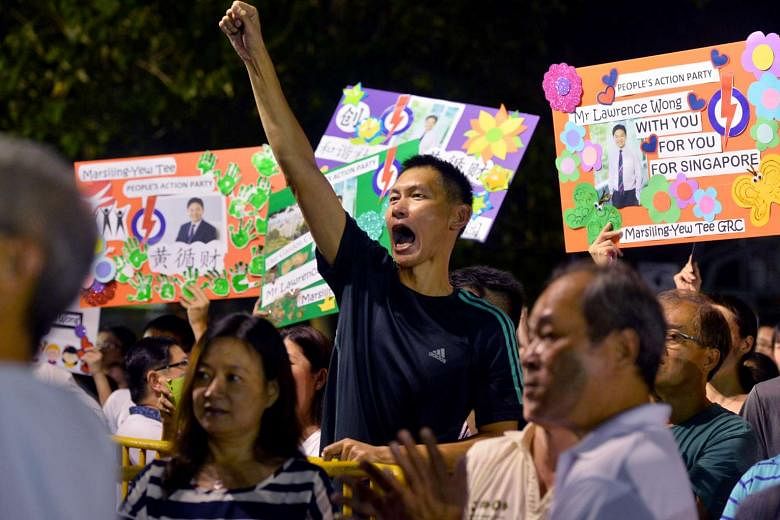There is no country in the world which has provided free healthcare and other social services without raising taxes for middle-income workers, said Deputy Prime Minister Tharman Shanmugaratnam at a People's Action Party (PAP) rally last night in Petir Road.
Mr Tharman, who was responding to policy proposals made by opposition parties, including the Singapore Democratic Party (SDP), said Singapore's tax system must stay progressive, and "where the rich pay more and the poor get more".
Mr Tharman, who is leading a five-member team to contest in Jurong GRC, spoke alongside the PAP candidates for Holland-Bukit Timah GRC, as well as Bukit Panjang SMC candidate Teo Ho Pin, at last night's rally.
The SDP has proposed several economic measures, including having a minimum wage, raising personal income taxes for the top 1 per cent of earners and increasing social spending, particularly on public healthcare.
These proposals only consider "what the government gives with one hand, without talking about what the government takes with the other hand", said Mr Tharman, who is also Finance Minister.
"And, of course, every government has to take taxes from people with one hand and give benefits with another hand. The question is: Who pays and who benefits? Is it fair?"
For example, France's healthcare system - cited as a positive example by the SDP - provides benefits to all including the rich, but imposes a high burden on middle-income workers, Mr Tharman said.
The average French worker pays well over 20 per cent of his income in taxes to the government. This is even before taking into account the payroll taxes, which come out of wages and are an important source of funding for the French healthcare system.
"So when you think of free healthcare or close-to-free healthcare... you must realise that it is not free. The average citizen is paying for it and paying for it big time in these countries," he added.
"And they are also paying more because everyone, including the rich and the upper-middle-income group, is benefiting."
By comparison, Singapore's system imposes a smaller burden on middle-income earners while also giving fewer benefits to the rich, Mr Tharman said.
For every $1 paid in taxes by a middle income family, they will get back $2 in subsidies.
For every $1 in taxes the poor pay, which is mainly GST, they get back $6 in subsidies.
For those in the top 10 per cent, for every $1 they pay, they get back 20 cents.
In Finland - often held up with other Scandinavian nations as a model of egalitarianism - for every $1 paid in taxes, the middle-income group receives $1.30.
"It's a complete myth to think that these are egalitarian systems," Mr Tharman said.
He also sought to dispel the "myth" that the Government can draw on investment income in the country's reserves, instead of raising taxes, to fund social spending.
"We are already maxing out on the investment income from our reserves... We're spending it fully on our increased social spending, on healthcare, on our infrastructure.
"It's fully used, there's no more money left there that you can just take without compromising the next generation," he said.
The Government, he said, has taken measures to raise the revenue needed for the next five years, including raising income and property taxes, and taking more of the returns earned by Temasek Holdings.
These moves will raise an extra $4 billion a year over the next five years, Mr Tharman said.
"We have done it in advance, no bluff, no pretence, we've made very clear we have extra spending needs...

"So when I listened to some of the scaremongering that is going on, not only do they avoid talking about the taxes that they will have to raise if their proposals were to be put into practice, but they also scaremonger, talking about what the PAP will do after the elections. That is just cheap," he said.




